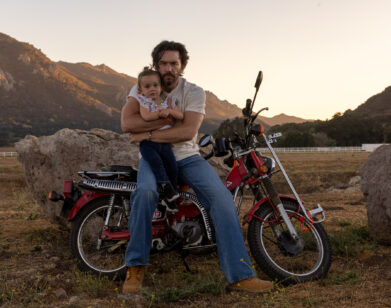What Jonathan Groff learned from the warped minds of serial killers
Mindhunter, David Fincher’s ingenious true crime series for Netflix and the OG Making a Murderer, has found success thanks in part to our country’s evergreen fascination with sociopaths and serial killers. The show takes inspiration from the real FBI agents who interviewed men then called “sequence murderers”, beginning in the ’70s, as they probed their warped minds for a better psychological understanding of what makes them tick. What results is both a fascinating account of history and a deep dive into the horror of the male psyche.
At the center of it all is Special Agent Holden Ford—played with unassuming likability by 32-year-old Jonathan Groff. He’s a scrupulous man who, with a surprising amount of interest and gusto, comes face to face with society’s most dangerous pariahs. And really, who can blame Ford for being absorbed by the Charles Mansons and Ted Bundys of the world? Groff can, actually. “I was not a serial killer aficionado by any means,” the former Hamilton star says over the phone. “I had seen the occasional movie or documentary here or there,” Groff continues, “but I had friends that were obsessed and knew who [mass murderer] Richard Speck was when I said him. I was like, ‘Whoa.’ ”
Despite his initial reluctance, Groff threw himself headfirst into the role, learning tics from real life serial killers of yore to get closer to his character. Here’s what he learned.
THE SEXUAL HABITS OF SERIAL KILLERS
JONATHAN GROFF: The thing that I learned most of all is that there is, on occasion, a method to the madness. I didn’t know basic things like they often return to the crime scenes to masturbate. They’ll go back to re-engage with their sexual pleasure. It’s also why they’ll keep body parts. They’ll do a kill and then they’ll either return to the crime scene, or they’ll pull that foot out of the freezer. It’s to get as much residual sexual gratification as they can, and then once they feel like they’ve used all that up they’ll go back and start over again.
MOST KILLERS HAVE DADDY AND MOMMY ISSUES
GROFF: So much of it had to do with—and weirdly with all of [the killers] that we covered in the first season—parental issues, usually like an absent father and a damaging mother. [Ed] Kemper [the “Co-ed Killer” who murdered 10] had such a bad relationship with his mother and he built up to killing her, because he started with the co-eds. You learn his mom was a teacher and a lot of him wanting to kill those women was him feeling insecure about his ability to get women, because his mother was so hard on him about that. He fulfilled his emotional arc of getting back at his mother. He said at one point—I don’t even know if we say on this show—he cut off her head and put it on a mantle and screamed at it for an hour.
HIS CHARACTER’S PERSONALITY BLED INTO HIS REAL LIFE
GROFF: Holden is very anal and particular, and that is so not who I am. When I sat down with David [Fincher], he said, “Can you not get sick for a year? You’re going to be on set for a year.” I said yes and was so excited to do that, but I had a very specific diet and I made sure I had six or seven hours of sleep every night. I suddenly became very militaristic in my life. I woke up literally every single morning and had a run before we started shooting, so my brain was clear and my weight didn’t fluctuate. That reflected the way my character was, and I didn’t think about it until the very end.
TRAGEDY UNFORTUNATELY MIRRORED THE SHOW
GROFF: What was so weird was the Las Vegas shooting happening two weeks before the show came out. We were sitting there getting ready to do press for the show, and there’s this mass murderer killing all of these people, and [we’re] looking for a motive and not finding one. In some ways, I feel like this has always been there—there’s always been serial killers. I think in some ways the culture caught up to what was happening in the ’70s, and now we were ready to look at those things in a more complicated way. One of the big questions of the show is can you fake empathy to try to understand people who are deplorable and subhuman, and what is the cost of that. I think that is a question we are still asking ourselves today in a million different ways.
LIFE ADVICE FROM HIS CHARACTER’S REAL LIFE INSPIRATION, JOHN E. DOUGLAS
GROFF: The thing that really stuck out to me is what he always mentions in his emails, and you really get a sense of it when you read his book [Mindhunter] as well: the extreme emotional and physical toll that talking to the serial killers, but even more so the victims and the victims’ families, had on him. He had a total mental and physical breakdown. He almost died from the toll of being so obsessed by and involved in this work. That obviously is something we touch on, and is articulated by Holden’s panic attack at the end of the first season. He’s great at compartmentalizing, but no matter how young and ambitious and hungry you are, this is going to catch up to you at some point.
MINDHUNTER IS AVAILABLE ON NETFLIX NOW.







